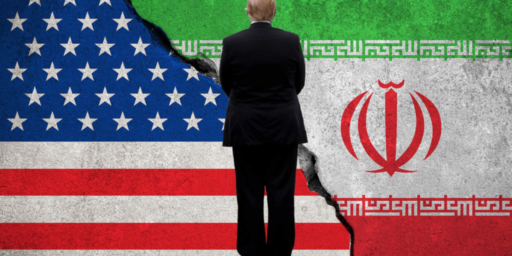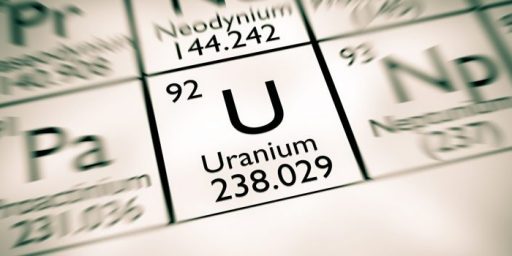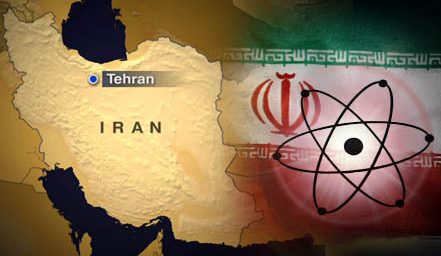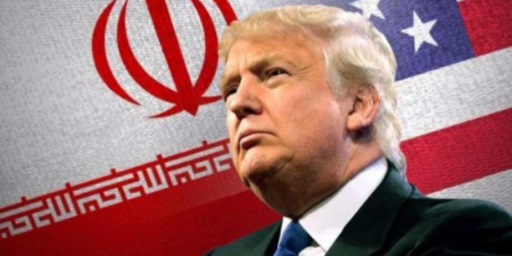Building While Bailing (Updated)
David Kay, former U. N. weapons inspector, has an op-ed in the Washington Post on the Iranian nuclear development program which I take as a veiled campaign advertisement for John McCain. In the op-ed Dr. Kay’s assessments are that, judging by the known knowns, Iran is likely to have a nuclear weapon in two to four years. Taking into account the known unknowns Iran may well have a nuclear weapon within a year or two. And the unknown unknowns? Who knows?
My humble best guess is that Iran is pushing toward a nuclear-weapons capability as rapidly as it can. But if Tehran were to believe that American — not Israeli — military action is imminent, it might slow work on the elements of its program that it thinks the world can observe. Yet such temporizing would only be tactical. Its strategic goal is to acquire nuclear weapons to counter what it views as a real U.S. threat. Iran appears to believe that the United States is not willing to accept the validity and survival of the Iranian revolutionary state.
So, what next? That’s what’s missing from the Iran debate and that forms the crux of Dr. Kay’s op-ed.
Two concerns seem to be most absent from discussion of Iran’s “nuclear future,” whatever it is: First, what policies would limit any advantage, political or military, that Iran might gain from such weapons? Second, how do we begin to craft, with all the states of the region — including Israel and Iran — political, economic and security arrangements that recognize their varied interests and concerns and their often very different perspectives on what these are? In the end, we need to decide how we can perform damage control and create arrangements that take into account states’ varied interests.
I seem to be one of the relative few who believe that neither the U. S. nor Israel is likely to attack Iran whether it has nuclear weapons or not in the near term and that it would be highly imprudent if they did. However, formulating a policy that prevents or discourages Iran from seeking or acquiring nuclear weapons that doesn’t include the use of military force certainly would seem to require a greater willingness to accept pain than we’ve exhibited lately.
UPDATE
Charles Ferguson, senior fellow for science and technology at the Council on Foreign Relations, writing in the Christian Science Monitor proposes a novel approach to breaking the logjam of negotiations with Iran:
A potential trust-building deal would bind the US and other nuclear energy states to Iran as clients under the condition that Iran accepts more rigorous safeguards on its nuclear program.
The clients would agree to buy Iranian enriched uranium and spent fuel containing plutonium for a competitive price. This would ensure that Iran would not amass a large stockpile of enriched uranium and plutonium but would continually ship this nuclear fuel material to clients.
Iranian leaders would show that their intentions are truly peaceful if they accepted this deal. And by accepting it Iran would gain international recognition for its enrichment program and could crow that they have the world’s superpower as a client. It would be a win-win situation.
He also re-states a point I’ve been making for years: Iran does not have enough indigenous uranium to achieve the self-sufficiency that’s the stated aim of their nuclear development program:
A country needs adequate supplies of natural uranium to begin the process. Also, it needs a fuel fabrication facility to turn the enriched uranium into fuel that can be placed inside the core of a nuclear reactor. Iran has neither of these major components. But the limited supplies of indigenous natural uranium and the pilot scale enrichment plant now in operation are enough to allow Iran to eventually make dozens of nuclear bombs.
That’s one of the many troubling things about Iran’s nuclear development program: either they’re nuts or they’re hiding something. Neither is particularly comforting.






Sadly, and in economic terms, this is a very low barrier to entry (very low).
This is purely a devil’s advocate position, but what would really be the harm if Iran got itself some nuclear weapons? Frankly, Iran’s government has shown itself to be much more willing to act in its own self-interest than North Korea’s or Pakistan’s, and both of the latter have nukes. There’s no evidence that Iran would ever launch an unprovoked attack with one.
Alex, as Kay notes in his op-ed one of the problems posed by Iran’s acquisition of nuclear weapons is that we don’t really know what their intentions are. They’ve certainly dropped broad hints that they’d use nuclear weapons in an unprovoked attack if they had them. They’ve also said they wouldn’t use them.
What does one believe?
HOW REFRESHING TO READ AN ARTICLE THAT OFFERS A SOLUTION, RATHER THAN POUNDING ON THE PROBLEM!!
THE IDEA IS LOGICAL AND CERTAINLY WOULD END THE THREAT AND WOES THAT FACE ALL OF US.
SO GLAD TO READ SOMETHING POSITIVE-BASED!
It would mean that the rest of the world must accept the Iranian government as it is. No Iraq-styled regime change would be possible once they have nuclear weapons. It also means the rest of the world would be somewhat more limited in it’s options to counter Iranian aggression against it’s non-nuclear neighbors.
It’s not the nuclear weapons that we would be worried about, it would be an unprovoked attack using conventional weapons because, as I stated above, we’re limited in how much we could use our conventional forces to counter it without provoking a nuclear response.
I’m not sure I agree with your assessment of the value of a handful of nuclear weapons, Michael. Indeed, there was a little colloquium not long ago (I’ll try to dredge up the link) on just this subject and the consensus was that a small number of nuclear weapons might well provoke a decapitating strike.
I’m thinking less of our circumstances than those of Israel. Israel would be placed in quite a pickle by a nuclear-armed Iran. Israel couldn’t survive even a smallish nuclear attack and might well elect total preemptive obliteration of the enemy to the extent that it was in their power rather run the risk of obliteration themselves.
Israel is reputed to have something like 150 nuclear devices.
True, I hadn’t thought of that. But wouldn’t that require knowing where to strike? If Iran had a hand full of nuclear warheads, I doubt they’d keep them all in the same proverbial basket.